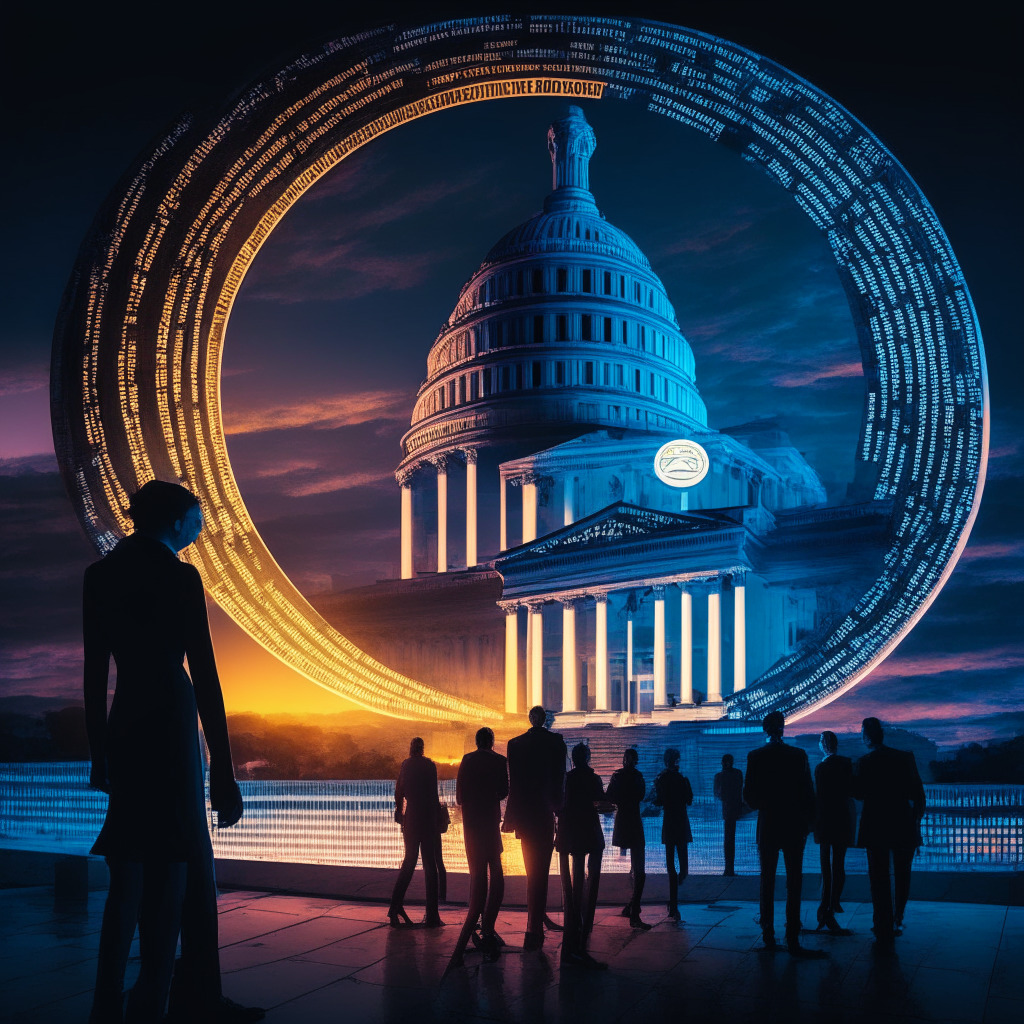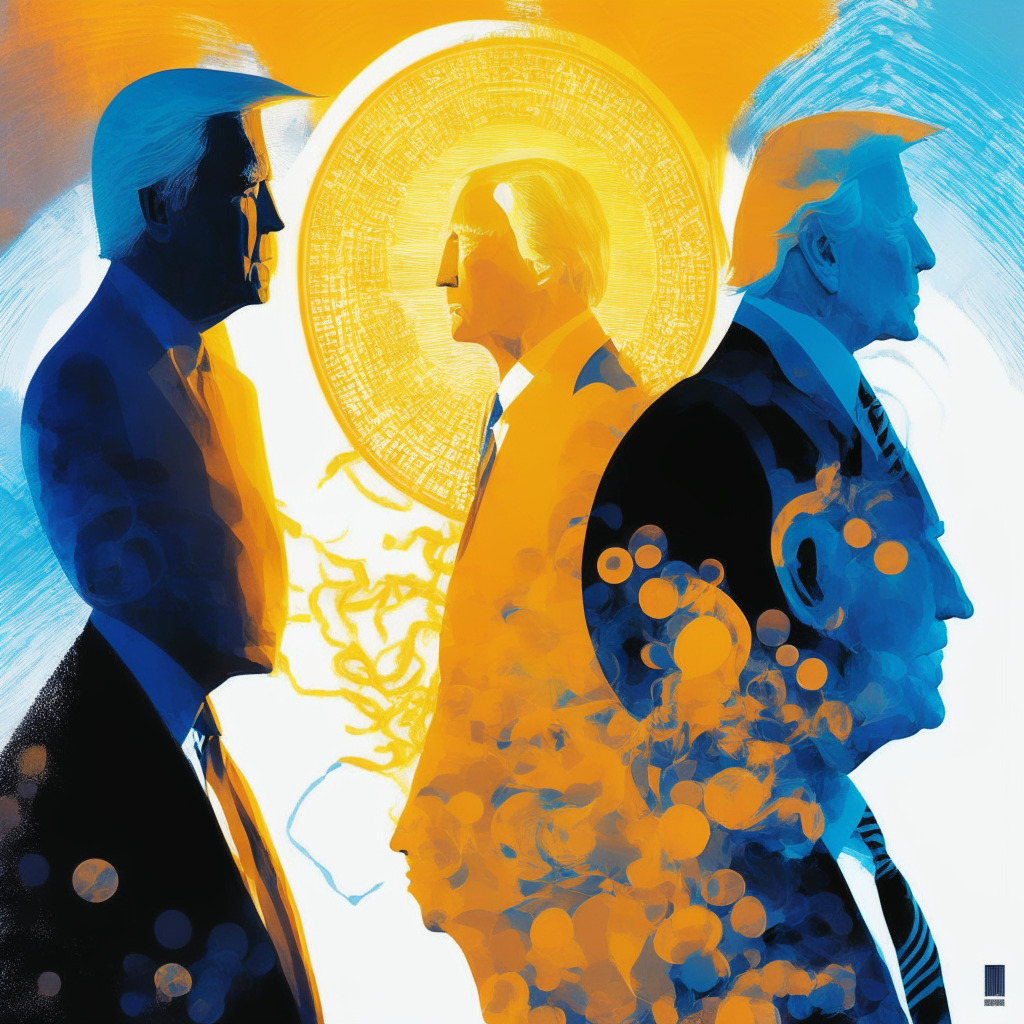“The United States House Financial Services Committee is considering further restrictions on a central bank digital currency (CBDC). Critics argue that a CBDC would centralize control, contradicting the philosophy behind cryptocurrency, and posing potential privacy risks. Despite some progress, the future of a U.S. CBDC remains uncertain.”
Search Results for: ron desantis
Battleground CBDC: A Bipartisan Struggle Shaping Cryptocurrency’s Future in the U.S.
The House Financial Services Committee introduced three bills halting the Federal Reserve’s considerations towards a Central Bank Digital Currency (CBDC). Republicans expressed fears over the potential impact on traditional banking and the suspense it could cast on the stablecoin market. Democrats, however, pushed for continued CBDC exploration, reminding of its potential benefits in global economic competition. The Federal Reserve reaffirmed its cautious approach towards CBDC, emphasizing concerns over a stablecoin issuance without federal control.
Navigating the Political Minefield of Central Bank Digital Currencies (CBDCs)
“Central bank digital currency (CBDC) enthusiasts face political opposition, despite the digital euro’s benefits such as EU-wide usability, unmatched privacy in digital payments, and independence from foreign payment providers. Opponents worry CBDCs could enable governmental overreach and surveillance, shifting discussions to the credibility of central banks. “
Shaping Elections 2024: How Cryptocurrency Could Swing the Political Pendulum
“Crypto guru, Brian Armstrong, predicts that the exploding interest in crypto will turn it into a defining issue in the 2024 elections. As 56 million Americans already operate with digital currency, its potential implications are engaging presidential candidates. However, the quest for clear crypto regulation still looms, with opportunities for legislative clarity potentially arising from the Securities and Exchange Commission.”
Exploring the Political Spectrum: The Rising Influence of Bitcoin Mining and Cryptocurrencies
Senator Ted Cruz endorses Bitcoin, highlighting its potential in bolstering energy grid resilience—an advantage in emergencies, such as the recent Texas extreme weather. The stance reflects the growing influence of digital currencies, despite potential hurdles and economic turbulence.
Reshaping America’s Financial Future: The Digital Dollar Dilemma and Road to CBDC Regulation
The House Financial Services Committee is preparing to discuss the implications and regulation of a digital dollar or Central Bank Digital Currencies (CBDCs), along with private sector alternatives. This conversation, following various states erecting legislative boundaries for CBDCs and $41 million hacking of a crypto site, underlines the need for balance between innovation and robust regulatory frameworks.
Navigating the Blockchain Future: The Impact of Federal Leadership Changes on Crypto Regulation
“The leadership at institutions like the Federal Reserve significantly influence policy changes, specifically cryptocurrency and blockchain regulation. While the US Federal Reserve reportedly has no plans for a digital dollar, the recent changes in leadership may significantly impact future policy. As cryptocurrencies and blockchain technology reshape financial systems, the balance between innovation and regulation remains a focus.”
Grayscale Court Victory: A Landmark for US Crypto Industry or SEC Overreach?
Republican Presidential candidate Vivek Ramaswamy perceives Grayscale Investments’ recent courtroom victory over the SEC as a critical defense for blockchain and Bitcoin innovation in the U.S. He plans to rollback federal regulations that hinder the growth of crypto markets if they don’t meet Supreme Court tests, while criticizing the contentious approach of regulation by enforcement preferred by the SEC.
Miami’s Blockchain Mayor Bows Out: What Suarez’s Presidential Campaign Suspension Means for Cryptocurrency Future
“Suarez, Miami’s Mayor, known for his bitcoin-friendly stance, accepted bitcoin as campaign donation and has explored the use of blockchain technology. Despite facing challenges, his pursuit of these technologies prompts discussion on the role of digital currencies in future political campaigns and public administration.”
Crypto Regulation: Candidates’ Stances and Upcoming Election Implications
“Crypto regulation has become a significant issue in U.S. presidential campaigning. Candidates’ positions vary widely, from skepticism to enthusiastic adoption, yet the subject of digital assets regulation was absent from the recent Republican debate. This highlights the increasing importance of cryptocurrencies in our socio-political landscape, and suggests a need for informed legislation.”
Surge in Blockchain Betting Forecasts a Potential Dark Horse in 2024 Presidential Race
“Bitcoin-friendly entrepreneur Vivek Ramaswamy emerges as a formidable contender in the 2024 U.S. Republican presidential nomination. Blockchain-based betting platforms indicate his growing popularity, signifying possible cryptocurrency and blockchain acceptance in political scenarios. Though legally limited, this technology may revolutionize gauging public sentiment.”
Blockchain Based Prediction Markets: A Glimpse into the Future of Political Betting
“Blockchain-based prediction markets like Polymarket are gaining momentum as an alternative indicator for political outcomes. Despite their contested legal status, they offer unique insight into public sentiment, recording shifts in standing following events like debates. Fueled by millions in bets, these platforms may set records this election cycle, despite potential regulatory hurdles.”
Presidential Hopeful Vivek Ramaswamy Banks on Crypto: Innovating Campaign Funding or Legal Liability?
“Up-and-coming US Republican presidential candidate, Vivek Ramaswamy, known for his pro-crypto stance, is accepting Bitcoin contributions for his campaign, reflecting the increasing influence of digital currencies in the financial landscape. However, his political journey faces potential setbacks due to legal issues with previous employees.”
Former President Trump’s Surprising Foray into Cryptocurrency and NFTs: A Paradigm Shift or Sheer Opportunism?
“Former US President Donald Trump reportedly owns digital assets worth between $250,000 and $500,000, largely boosted by sales from his NFT trading cards. This comes despite previous comments disparaging cryptocurrencies. Trump’s decision amidst divisive views on digital assets could potentially influence the upcoming White House bid for 2024.”
Skeptical Voices: Rapper Post Malone and US CBDCs Debate Stir Crypto Community
American Rapper Post Malone expressed skepticism about the potential Central Bank Digital Currency, associating it with increased government control. The duo highlighted risks including growing state control, potential loss of citizen’s income and potential impacts on social credit scores and behavioral control. Such concerns have sparked discussions in the crypto community.
Central Bank Digital Currency: A Financial Freedom Foe or Decentralized Ally?
Joe Rogan and Post Malone voiced skepticism about US central bank digital currency (CBDC), seeing it as potentially enabling government control over individual finances. This controversy, along with alternatives such as decentralized cryptocurrencies, forms a pivotal part of ongoing discussions about the future of digital currencies.
2024 U.S. Presidency & Crypto: Favouring Central Bank Digital Currencies or Upholding Bitcoin?
“According to Grayscale, presidential candidates Joe Biden and Donald Trump might support the development of central bank digital currency (CBDC), despite their unclear stance on Bitcoin. Other candidates have expressed both support for cryptocurrencies and opposition to CBDCs. Amidst this, regulatory uncertainty tests the resilience of crypto firms and generates various views about the future of cryptocurrencies.”
Bitcoin Donations and MiamiCoin: Mayor Suarez’s Crypto-Political Strategy Unveiled
“Miami’s Bitcoin-friendly mayor, Francis Suarez, confirms on Coindesk TV that his presidential campaign would welcome Bitcoin donations. Despite the rocky journey of MiamiCoin, Suarez remains dedicated to cryptocurrencies, envisioning their potential to reshape wealth distribution in America.”
Presidential Hopeful’s Take on Bitcoin: Asset, but Not Dollar Stabilizer
Republican Presidential candidate Vivek Ramaswamy, while expressing fondness for Bitcoin, would not consider it as a component to stabilize the U.S. dollar. He believes the U.S. Federal Reserve should focus on maintaining dollar stability against traditional commodities.
Crypto Market Flux: Regulatory Tremors, Political Shocks, and IRS Intrusions
The crypto market recently experienced a plunge, with Bitcoin dipping around 2%, amidst political and lawsuit shocks. The SEC has accused Richard Heart, Hex creator, of selling unregistered securities worth $1 billion, causing the HEX price to plummet. This has led to increased anxiety in the crypto community, with investors also watching out for potential regulations. Meanwhile, the IRS has issued a ruling requiring US taxpayers to add crypto staking rewards to their annual income. Despite the challenges, crypto enthusiasts see potential in the top 15 digital assets for 2023, but caution and thorough research are advised.
Cryptocurrency: The Supremacy Race Between U.S and China in the Blockchain Era
In the current era of technological renaissance, the U.S. struggles to keep up with blockchain technology, while China continues to make significant progress with its central bank digital currency. Binance, reportedly handling a majority of global crypto trading volume, faces legal challenges in the U.S. amidst a larger climate of legal obscurity in the crypto industry.
Could Bitcoin Decide the Next President? Exploring Cryptocurrency’s Growing Political Influence
“Bitcoin and the crypto community could be deciding factors in a U.S. presidential election. Candidates now need to proclaim their stance on cryptocurrencies. The U.S. Federal Reserve estimates that 8%-11% of the American population, owning cryptocurrencies, can considerably influence the election. Anti-Bitcoin policies may thus, alienate a rapidly growing cohort of voters.”
Federal Reserve’s CBDC Hunt: A Financial Death Star or Leap Towards Progress?
“The San Francisco Federal Reserve Bank’s job posting for a “senior crypto architect” has sparked criticism. There are concerns CBDCs could be misused as tools for coercion and control. Representatives like Warren Davidson contend CBDCs should prioritize being a stable store of value and an efficient means of exchange, rather than being used for surveillance and control.”
Rally Against CBDCs: Freedom Fighters or Innovation Obstructors?
U.S. Republican Representative, Warren Davidson, has appealed to Congress to ban Central Bank Digital Currencies (CBDCs), equating their creation to “building the financial equivalent of the Death Star.” Davidson argues that CBDCs convert money into a tool for coercion and control, rather than a stable store of value. Counterarguments maintain that CBDCs represent the natural evolution of digitizing finance. The debate underscores the need for well-regulated, informed approaches to digital finance’s future.
Exploring FedNow’s Implications: An Unintentional Preparation for CBDC or a Privacy Nightmare?
“The U.S. Federal Reserve’s FedNow initiative may inadvertently pave the way for the necessary infrastructure required by a potential CBDC (Central Bank Digital Currency) in the U.S. While not a digital token, it creates a platform that could facilitate this. The prospect has raised fresh concerns over potential surveillance and control around a digital dollar.”
Unpacking Kennedy’s Bold Bitcoin Backing Proposal: Economic Boon or Bane?
Robert F. Kennedy Jr., a presidential candidate, controversially proposes to back the US dollar with Bitcoin to strengthen the economy and curb inflation. Skeptics voice concerns over Bitcoin’s volatility and potential issues of economic inequality resulting from proposed tax exemptions on Bitcoin-to-dollar conversions.
Crypto Crusade: Blockchain Advocate’s Bid for Texas House and Wider Implications for Crypto Politics
“Steven Kinard, director of Bitcoin mining analytics at the Texas Blockchain Council, plans to run for the Texas House of Representatives. Advocating for digital freedom and strategic tech investments, he expresses concerns over the U.S. Federal Reserve’s attempts to introduce a CBDC. As the 2024 elections approach, the role of crypto regulation in legislative agendas holds prominence.”
Exploring the Impact of the Responsible Financial Innovation Act on Cryptocurrency Future
US Senators Cynthia Lummis and Kirsten Gillibrand plan to reintroduce the Responsible Financial Innovation Act, a regulatory bill for digital assets. The legislation aims to define the SEC and CFTC roles in regulating digital assets and enhance consumer protection, potentially safeguarding against future market crashes. However, there are fears that this could suppress innovation in the sector.
Predicting an Era of Central Bank Digital Currencies: Future Boon or Crypto Bale?
“Switzerland-based BIS predicts the issuance of as many as 15 retail Central Bank Digital Currencies (CBDCs) by decade’s end, with 93% of Central Banks globally involved in CBDC research, planning and piloting. The trend towards CBDCs might bridge the financial gap among the unbanked worldwide, but raises questions about traditional cryptocurrencies’ value as CBDCs would be government-controlled.”
Bitcoin ETFs – A False Dawn or a Beacon of Hope? Be Ready for the Crypto Rollercoaster
The recent dip in Bitcoin price followed a wave of ETF applications in the US which failed to shift market sentiment as anticipated. JPMorgan’s analysis suggests lack of transformative potential in the US ETF landscape. Despite this, ‘whales’ have accumulated an additional equivalent of $2.15 billion in Bitcoin, opposing the JPMorgan analysis. Understanding volatility and risk in digital assets is crucial before making financial decisions.
Global Infrastructure for CBDCs: Balancing Benefits and Privacy Concerns
The IMF is working on a global infrastructure concept to promote interoperability between digital currencies issued by national central banks. With 114 countries actively exploring central bank digital currencies (CBDCs), concerns over privacy and potential drawbacks accompany the potential for enhanced financial services worldwide.
US 2024 Elections: The Crypto Focal Point, Bipartisan Approaches & Prospects
The United States is moving toward a cohesive policy framework for digital assets, with lawmakers evaluating bills related to stablecoins, securities rules, and sanctions. Both parties in the 2024 presidential race are expected to address crypto, but the GOP must focus on embracing blockchain’s potential for America’s long-term economic interests, dispelling misconceptions, and supporting crypto-friendly regulations.






























